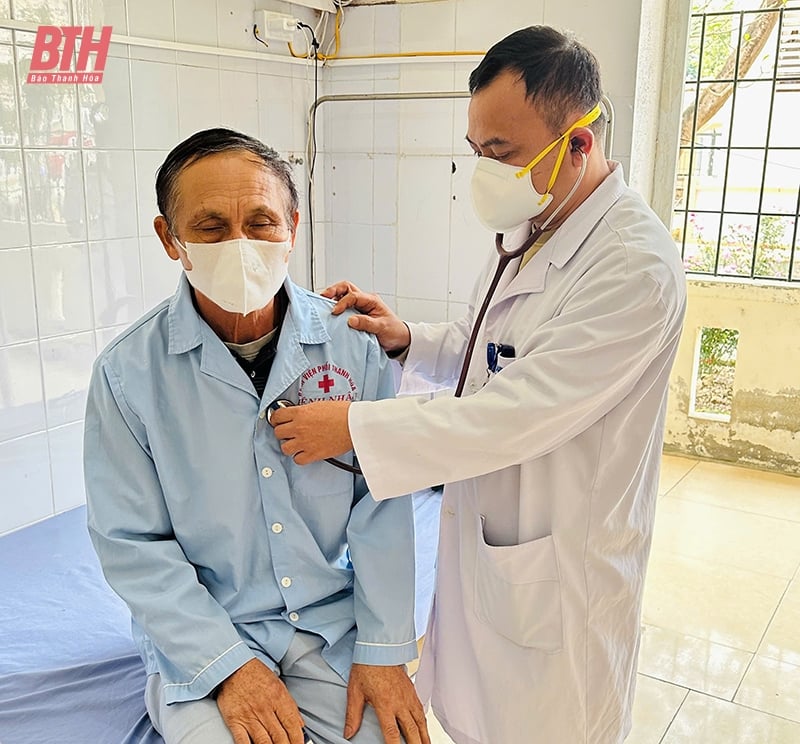Drug-resistant tuberculosis patients treated at Thanh Hoa Lung Hospital.
In Thanh Hoa, in recent years, the province has synchronously deployed interventions to prevent and control tuberculosis and achieved positive results in implementing the National Tuberculosis Control Program. The tuberculosis control network has always been maintained and strengthened from the provincial level to the district, commune, ward and town levels. At the same time, it has been deployed to 4 prisons and 1 drug rehabilitation facility, so that all people have access to tuberculosis prevention and control services. Propaganda work on tuberculosis and prevention and control continues to be promoted, helping people understand, not feel stigmatized against tuberculosis, and proactively access and use tuberculosis examination, diagnosis, treatment and prevention services. Along with that, the Tuberculosis Control Program prioritizes strengthening solutions to detect tuberculosis patients, especially proactive detection in the community; ensuring quality of treatment management, moving towards completing the goal of eliminating tuberculosis by 2030.
In addition to the achieved results, the work of preventing and controlling tuberculosis still faces many difficulties, the number of tuberculosis patients detected each year only accounts for about 60% of the estimated number of tuberculosis patients. Thus, more than 40% of tuberculosis patients in the community have not been detected and treated. Late detection not only makes treatment difficult but also increases the risk of spreading. In addition, patients who do not comply with the doctor's treatment regimen will lead to drug-resistant tuberculosis. At that time, tuberculosis bacteria are resistant to anti-tuberculosis drugs, making treatment very difficult. In 2024, Thanh Hoa Lung Hospital detected and treated more than 1,700 new tuberculosis patients, including 65 patients with drug-resistant tuberculosis. The main reason is that patients do not comply with the regimen, arbitrarily reduce the dose or stop taking the medicine before the treatment period is over.
Master Nguyen Van Thanh, Head of the Line Command Department, Head of the Examination Department, Thanh Hoa Lung Hospital, said: Drug-resistant tuberculosis is a disease condition in which tuberculosis bacteria are resistant to anti-tuberculosis drugs, making treatment difficult and the patient himself becomes a dangerous source of infection for the community. Having drug-resistant tuberculosis will cause the patient to face a serious health condition along with treatment that costs a lot of time and money. Drug-resistant tuberculosis causes many serious consequences, directly affecting the health of the patient and the community. The treatment process becomes more difficult because the time may need to be extended to 24 months, it is necessary to combine more anti-tuberculosis drugs than usual, and anti-tuberculosis drugs also have many side effects and are very expensive, many times higher than conventional anti-tuberculosis drugs; the treatment effectiveness is also lower, with a cure rate of only about 65 - 70%. Currently, the National Tuberculosis Control Program is providing free treatment for all tuberculosis patients and providing additional support during the treatment process for patients with drug-resistant tuberculosis. Tuberculosis patients should strictly follow the treatment principles to achieve the best results.
To effectively control tuberculosis, health experts recommend early detection, adequate treatment and proper regimen. BCG vaccination against tuberculosis for newborns helps reduce the risk of severe tuberculosis such as miliary tuberculosis and tuberculous meningitis. For prevention, people with tuberculosis need to strictly follow the correct treatment regimen. People should proactively have regular health check-ups, especially if they have close contact with people with tuberculosis or are in high-risk groups such as the elderly, people with immunodeficiency, people with HIV... Tuberculosis prevention is not only the responsibility of the health sector but also requires the cooperation of all levels, sectors and each individual. When there are signs such as: continuous cough lasting more than two weeks, low-grade fever, fatigue, poor appetite, unexplained weight loss, night sweats and low-grade fever in the afternoon... you need to go to a specialized medical facility immediately to be diagnosed with tuberculosis, and have specialized tests to have an appropriate treatment regimen. Tuberculosis can be completely cured and prevented from spreading to the community if detected early and treated properly.
To achieve the goal of ending tuberculosis by 2030, in accordance with the global strategy and Vietnam's commitment, in the coming time, the health sector will continue to promote community screening, enhance training of primary health care workers, update new techniques in testing and treatment, and promote healtheducation and communication to raise awareness and consensus from the whole society. Only when people understand correctly and act early can we control and gradually eliminate tuberculosis from the community.
Article and photos: To Ha
Source: https://baothanhhoa.vn/gia-tang-benh-nhan-mac-lao-khang-thuoc-250168.htm



![[Photo] Prime Minister Pham Minh Chinh receives leaders of Excelerate Energy Group](https://vphoto.vietnam.vn/thumb/1200x675/vietnam/resource/IMAGE/2025/5/29/c1fbe073230443d0a5aae0bc264d07fe)


![[Photo] Prime Minister Pham Minh Chinh attends the event "Digital transformation of the banking industry by 2025"](https://vphoto.vietnam.vn/thumb/1200x675/vietnam/resource/IMAGE/2025/5/29/0e34cc7261d74e26b7f87cadff763eae)



























































































Comment (0)